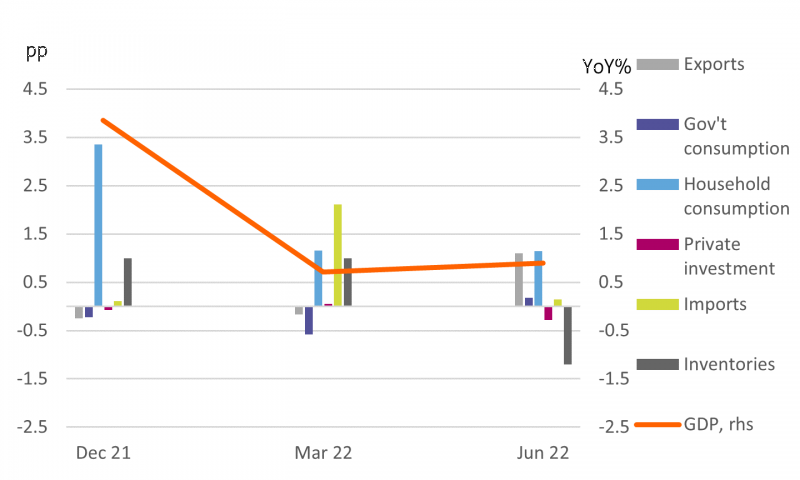Wednesday, September 7, 2022 3:53 AM EST
At an annualized pace of more than 3.5%, the 2Q22 GDP data indicates the scale of the task facing the Reserve Bank in taming demand sufficiently to dampen inflation.

Unsplash
Growth as expected - still strong though
2Q22 GDP growth in Australia was 0.9% quarter-on-quarter, in line with the market consensus, though the year-on-year rate came in a bit higher at 3.6% YoY from an expected 3.4%, due to downward revisions to previous GDP numbers, lifting the annual comparison.
2Q22 contributions to QoQ GDP growth by expenditure type

Source: CEIC, ING
Consumer spending remains strong
The chart above illustrates the contribution to the GDP total growth figure from selected expenditure categories, and it sheds light on the problem facing the Reserve Bank of Australia (RBA).
Firstly, household consumer spending is still growing rapidly, adding 1.1ppt to the headline figure. This will need to come down if overall demand is to soften sufficiently to dampen inflation. Private gross fixed capital formation (private capex) is looking much more subdued, which reflects weakness not just in residential construction, but across the whole investment spectrum. This segment of the economy has been soft for some time and it is unlikely to dramatically improve given the rates and tough external background...it could even get worse.
Net exports (exports minus imports) are still doing a lot of the heavy lifting. Imports didn't deliver any drag this quarter and exports were a positive boost. But unless domestic demand softens, we should expect the contribution from this sector overall to diminish in the quarters ahead.
There is also likely to be a boost next quarter from inventory accumulation, given the drawdown apparent this quarter, so we may be in for another similar headline figure of around 1.0% QoQ in 3Q22. If so, that would put full-year 2022 GDP growth on track to exceed 4% - not really conducive to getting inflation down rapidly and might indicate that rates will have to go higher and stay higher for longer to achieve the RBA's aim.
More By This Author:
Rates: Government Cash Management Set To Worsen The Euro Collateral Shortage FX Daily: Equity Divergence Is Becoming More Relevant Reserve Bank Of Australia Raises Rates Again
Disclaimer: This publication has been prepared by the Economic and Financial Analysis Division of ING Bank N.V. (“ING”) solely for information purposes without regard to any ...
more
Disclaimer: This publication has been prepared by the Economic and Financial Analysis Division of ING Bank N.V. (“ING”) solely for information purposes without regard to any particular user's investment objectives, financial situation, or means. ING forms part of ING Group (being for this purpose ING Group NV and its subsidiary and affiliated companies). The information in the publication is not an investment recommendation and it is not investment, legal or tax advice or an offer or solicitation to purchase or sell any financial instrument. Reasonable care has been taken to ensure that this publication is not untrue or misleading when published, but ING does not represent that it is accurate or complete. ING does not accept any liability for any direct, indirect or consequential loss arising from any use of this publication. Unless otherwise stated, any views, forecasts, or estimates are solely those of the author(s), as of the date of the publication and are subject to change without notice.
The distribution of this publication may be restricted by law or regulation in different jurisdictions and persons into whose possession this publication comes should inform themselves about, and observe, such restrictions.
Copyright and database rights protection exists in this report and it may not be reproduced, distributed or published by any person for any purpose without the prior express consent of ING. All rights are reserved. ING Bank N.V. is authorised by the Dutch Central Bank and supervised by the European Central Bank (ECB), the Dutch Central Bank (DNB) and the Dutch Authority for the Financial Markets (AFM). ING Bank N.V. is incorporated in the Netherlands (Trade Register no. 33031431 Amsterdam). In the United Kingdom this information is approved and/or communicated by ING Bank N.V., London Branch. ING Bank N.V., London Branch is deemed authorised by the Prudential Regulation Authority and is subject to regulation by the Financial Conduct Authority and limited regulation by the Prudential Regulation Authority. The nature and extent of consumer protections may differ from those for firms based in the UK. Details of the Temporary Permissions Regime, which allows EEA-based firms to operate in the UK for a limited period while seeking full authorisation, are available on the Financial Conduct Authority’s website.. ING Bank N.V., London branch is registered in England (Registration number BR000341) at 8-10 Moorgate, London EC2 6DA. For US Investors: Any person wishing to discuss this report or effect transactions in any security discussed herein should contact ING Financial Markets LLC, which is a member of the NYSE, FINRA and SIPC and part of ING, and which has accepted responsibility for the distribution of this report in the United States under applicable requirements.
less
How did you like this article? Let us know so we can better customize your reading experience.





